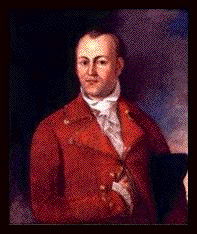Encyclopedia Dubuque
"Encyclopedia Dubuque is the online authority for all things Dubuque, written by the people who know the city best.”
Marshall Cohen—researcher and producer, CNN
Affiliated with the Local History Network of the State Historical Society of Iowa, and the Iowa Museum Association.
CHOUTEAU, Auguste: Difference between revisions
No edit summary |
No edit summary |
||
| Line 15: | Line 15: | ||
Chouteau, the administrator of Dubuque's estate, sent his nephew [[CHOUTEAU, Jean Pierre|Jean Pierre CHOUTEAU]] to the mines in June 1810, to inventory Dubuque's personal property. At the auction that followed, Auguste Chouteau paid himself a 10 percent commission of $1,424.35. | Chouteau, the administrator of Dubuque's estate, sent his nephew [[CHOUTEAU, Jean Pierre|Jean Pierre CHOUTEAU]] to the mines in June 1810, to inventory Dubuque's personal property. At the auction that followed, Auguste Chouteau paid himself a 10 percent commission of $1,424.35. | ||
The issue of who finally owned the land was not settled until the case of [[CHOUTEAU | The issue of who finally owned the land was not settled until the case of [[CHOUTEAU v. MOLONY]]. | ||
--- | --- | ||
Revision as of 04:12, 27 April 2015
Family History: http://wc.rootsweb.ancestry.com/cgi-bin/igm.cgi?op=GET&db=larousse&id=I115995
CHOUTEAU, Auguste. (New Orleans, LA, Sept.7, 1749-St. Louis, MO, Feb. 24, 1829). Auguste Chouteau was the son of Rene Chouteau who at the age of twenty-five married fifteen-year old Marie Therese Bourgeois of New Orleans. Rene and Marie had one son, Auguste, before his mistreatment of his young bride cause him to return to France. Marie remarried Pierre de Laclede Liguest (commonly known historically as Laclede) and they had additional children including Pierre CHOUTEAU. Prevented by the Catholic Church from divorcing her absent husband, Marie named all her children Chouteau although she and Laclede lived together as man and wife. (1)
Laclede joined Gilbert Antoine de Maxent in establishing the FUR TRADE along the MISSISSIPPI RIVER as a member of MAXENT, LACLEDE AND COMPANY. In 1720 he brought along his fifteen-year-old son, Auguste, along on a voyage north along the Mississippi. It was Laclede who chose the location, but it was his son who he left in charge of workmen to construct the first buildings in the settlement Laclede would name "St. Louis" in honor of Spain's King Louis XIV. (2)
Auguste and his half-brother Pierre quickly became important participants in American life. They traveled throughout the area of their Spanish grant meeting with leaders of the different tribes and bartering for furs. In 1777, the Spanish government granted Auguste and sixteen other traders sole permission to trade with the tribes. (3) Their travels took them to the Great Lakes, southwest into present-day Kansas, Oklahoma, Colorado, and New Mexico, and northwest past FORT UNION into the area of Yellowstone and the Rocky Mountains. (4) Following the American Revolution, the brothers added to their list of acquaintances such people as Thomas Jefferson, Meriwether Lewis, George Rogers Clark and William Henry Harrison. (5)
It was to Auguste Chouteau, the founder of the city of St. Louis, Missouri, to whom Julien DUBUQUE executed a deed of sale dated October 20,1804, while in St. Louis. In the deed, Dubuque sold 61,106 acres or approximately ninety-five square miles of his land for $10,848.60. This amounted to an estimated 48 percent of his entire land holdings.
The dividing line between Chouteau's property and that belonging to Dubuque lay at the mouth of CATFISH CREEK. Dubuque's buildings were to remain in his possession during his lifetime with another section of land to be granted to Chouteau if necessary. During his lifetime, Dubuque maintained control over Chouteau's land. The deed was recorded on December 3, 1804, in St. Louis.
Chouteau later sold half of his Dubuque claim to John Mullanphy of St. Louis. A final accounting finds Chouteau paid about six cents an acre for just less than one-fourth of Dubuque's MINING operation.
Chouteau, the administrator of Dubuque's estate, sent his nephew Jean Pierre CHOUTEAU to the mines in June 1810, to inventory Dubuque's personal property. At the auction that followed, Auguste Chouteau paid himself a 10 percent commission of $1,424.35.
The issue of who finally owned the land was not settled until the case of CHOUTEAU v. MOLONY.
---
Source:
1. Hoig, Stan. The Chouteaus: First Family of the Fur Trade, Albuquerque: University of New Mexico Press, 2008, p. 3
2. Ibid. p. 5
3. Ibid. p. 11
4. Ibid.
5. Ibid. p. 12


